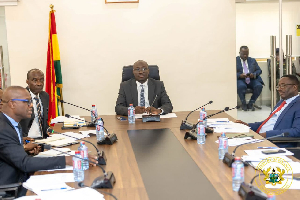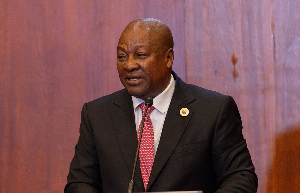Correspondence from Volta Region
More than sixty persons who have recovered from leprosy are under the roof of the Volta regional Cured Leper’s Camp, Free Town, Godokpui and main camp in Ho, the regional capital.
Many of these inmates are women between the ages of forty and above and were all drawn from different communities in the region after been cured of leprosy while some are still under treatment.
These people depends on intervention from donors and the Livelihood Empowerment Against Poverty (LEAP) programmes to survive, but how has been their situation amidst the pandemic?
On Thursday, 18 February 2021, GhanaWeb had a trip to the main camp to observe how these vulnerable ones are living their lives in the era of the COVID-19.
They have an equitable housing system at the various camps, at least one person is to a room with a porch, they’ve recently benefited from a solar system of generating power in addition to the national grid, there’s also an ongoing construction of fence wall around the entire camp and renovation of their administration block, sponsored by some donors from abroad.
The inmates thanked the donors and showered words of blessings on them. But apart from these interventions, what they need most is food and clothes to wear.
In an interaction with them, they blamed the novel coronavirus for hardship in the camp, saying donors are no longer coming to their aid as it used to be before the outbreak of the pandemic.
“ Food is needed, because some of the drugs we are taking needs food in our system to enable it to work, we’re in a nice room like this but hunger is disturbing us, we’ve been pleading but nothing seems to be changing, so please tell them (donors) again, we need foods to eat because even if it’s not our time to die, hunger can lead us to an early grave,” one Christine Botwe said.
Another inmate, Emmanuel Agbemade also narrated their ordeal saying “ before the coming of the second wave of the COVID-19, people used to come here with assorted items but now the situation has turned bad, as you can see, we’ve no means of making an income to feed ourselves so I’m only praying to God to touch someone to come to our aid”
“ the virus has indeed dilapidated the entire world, the way we used to survive has changed, no one is coming again, whites from abroad are no longer coming, we’re begging the general public to help us” one Afi Yaw Janet also pleaded.
According to them, getting access to further medical care is a challenge, they told GhanaWeb that, they are struggling to acquire medicines that the National Health Insurance Scheme (NHIS) does not cover, so in most cases, they’re made to return home without buying the prescribed drugs.
“Health issues are worrying us, whenever our situation get worst and we needed to be transferred to a nearby hospital for treatment, we don’t have any means so sometimes, we will have to hire a taxi and other commercial vehicles to transport us, and if we don’t have the money to pay for the prescribed medicines, we have to force, manage and buy it and if you don’t have the money at all, you just have to come home go-round for one or two weeks to raise the money and if you’re not fortune the sickness can defeat you” Emmanuel Agbemade noted.
They, however, appealed to the government to give them at least an ambulance to take care of such cases and also review their medication.
Life without family and friends
Surprisedly, many of the inmates were been abandoned by their families, most of them have spent more than two decades at the camp without their family, friends and love ones.
According to them, they feel rejected by the society, suffered stigma and left to die in the camp in sorrows and pains.
Madam Merry Ahiale is the oldest inmate at the camp, she said, she was admitted to the Ho leprosarium in 1960s after which she was moved to the camp in early 2000s, she is currently battling with hearing and seeing and weak memory but with much efforts, she narrated her ordeal.
“I can barely remember things, but I could remember that I came to the leprosarium two years after Dr. Kwame Nkrumah was overthrown, (have you been hearing from your family? She was asked) about my family? No one is here, do they even want to see me again? the one who was with me died sometime ago and on my mother’s side in Dakpa, they’re praying for my death, sometime ago, I sent greetings to them and to my amazement, they replied, asking if I’m still alive, is that fair? what’s the meaning of what they sent to me? It means they want me to die or?"
"They don’t ask of me, I’ve no one from mother side neither my father side, I’m for my self. I think there’s one person in Ho whom I can recollect, he is a teacher but the last time I heard from him is about six years ago, so about family I’ve no one to call upon” the poor aged woman narrated while lying halfway on her old mental bed in her room.
Many other inmates at the camp have a similar story, but few of them are having their children, grandchildren living with them, taking care of their cooking, washing among other house chores.
The women’s leader at the camp, Rejoice Nikabo expressed gratitude to their donors and appealed for further intervention most especially food items saying “ as my people have mentioned, the food is very necessary because we are not working to buy it, we need items such as rice, gari, cooking oil, tin fish, tomatoes, maize including toothpaste, soap and other detergents”
The caretaker of the camp, Mr. Nelson Atito has also appealed to the government and the general public to help him with a motorbike to enable him smoothly and swiftly run his mandates in and out of the various camps within the municipality.
He, however, called on the government to consider putting some of the newly admitted and old inmates on the LEAP payroll, this to also help reduce the level of poverty on the people and also reduce the pressure on individual donors and the government as well.

Regional News of Friday, 19 February 2021
Source: www.ghanaweb.com













